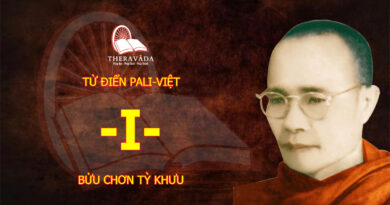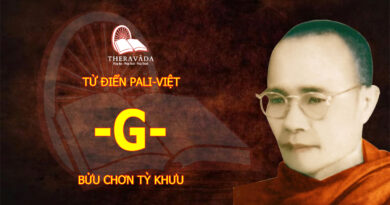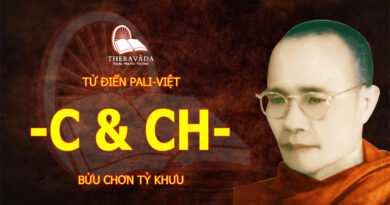Chapter 5: The Training Of Moral Conduct – The Art Of Living
Chapter 5. THE TRAINING OF MORAL CONDUCT
Our task is to eradicate suffering by eradicating its causes: ignorance, craving, and aversion. To achieve this goal the Buddha discovered, followed, and taught a practical way to this attainable end. He called this way the Noble Eightfold Path.
Once, when asked to explain the path in simple words, the Buddha said,
“Abstain from all unwholesome deeds, perform wholesome ones, purify your mind”—
this is the teaching of enlightened persons.1
This is a very clear exposition which appears acceptable to all. Everyone agrees that we should avoid actions that are harmful and perform those that are beneficial. But how does one define what is beneficial or harmful, what is wholesome or unwholesome? When we try to do this we rely on our views, our traditional beliefs, our preferences and prejudices, and consequently we produce narrow, sectarian definitions that are acceptable to some but unacceptable to others. Instead of such narrow interpretations the Buddha offered a universal definition of wholesome and unwholesome, of piety and sin. Any action that harms others, that disturbs their peace and harmony, is a sinful action, an unwholesome action. Any action that helps others, that contributes to their peace and harmony, is a pious action, a wholesome action. Further, the mind is truly purified not by performing religious ceremonies or intellectual exercises, but by experiencing directly the reality of oneself and working systematically to remove the conditioning that gives rise to suffering.
The Noble Eightfold Path can be divided into three stages of training: sīla, samādhi, and paññā. Sīla is moral practice, abstention from all unwholesome actions of body and speech. Samādhi is the practice of concentration, developing the ability to consciously direct and control one’s own mental processes. Paññā is wisdom, the development of purifying insight into one’s own nature.
The Value of Moral Practice
Anyone who wishes to practise Dhamma must begin by practising sīla. This is the first step without which one cannot advance. We must abstain from all actions, all words and deeds, that harm other people. This is easily understood; society requires such behavior in order to avoid disruption. But in fact we abstain from such actions not only because they harm others but also because they harm ourselves. It is impossible to commit an unwholesome action—to insult, kill, steal, or rape without generating great agitation in the mind, great craving and aversion. This moment of craving or aversion brings unhappiness now, and more in the future. The Buddha said,
Burning now, burning hereafter
the wrong-doer suffers doubly. . .
Happy now, happy hereafter,
The virtuous person doubly rejoices.2
We need not wait until after death to experience heaven and hell; we can experience them within this life, within ourselves. When we commit unwholesome actions we experience the hell-fire of craving and aversion. When we perform wholesome actions we experience the heaven of inner peace. Therefore it is not only for the benefit of others but for our own benefit, to avoid harm to our selves, that we abstain from unwholesome words and deeds.
There is another reason for undertaking the practice of sīla. We wish to examine ourselves, to gain insight into the depths of our reality. To do this requires a very calm and quiet mind. It is impossible to see into the depths of a pool of water when it is turbulent. Introspection requires a calm mind, free from agitation. Whenever one commits unwholesome action, the mind is inundated with agitation. When one abstains from all unwholesome actions of body or speech, only then does the mind have the opportunity to become peaceful enough so introspection may proceed.
There is still another reason why sīla is essential: One who practises Dhamma is working toward the ultimate goal of liberation from all suffering. While performing this task he cannot be involved in actions that will reinforce the very mental habits he seeks to eradicate. Any action that harms others is necessarily caused and accompanied by craving, aversion, and ignorance. Committing such actions is taking two steps back for every step forward on the path, thwarting any progress toward the goal.
Sīla, then, is necessary not only for the good of society but for the good of each of its members, and not only for the worldly good of a person but also for his progress on the path of Dhamma.
Three parts of the Noble Eightfold Path fall within the training of sīla: right speech, right action, and right livelihood.
Right Speech
Speech must be pure and wholesome. Purity is achieved by removing impurity, and so we must understand what constitutes impure speech. Such acts include: telling lies, that is, speaking either more or less than the truth; carrying tales that set friends at odds; backbiting and slander; speaking harsh words that disturb others and have no beneficial effect; and idle gossip, meaningless chatter that wastes one’s own time and the time of others. Abstaining from all such impure speech leaves nothing but right speech.
Nor is this only a negative concept. One who practises right speech, the Buddha explained, speaks the truth and is steadfast in truthfulness, trustworthy, dependable, straightforward with others. He reconciles the quarrelling and encourages the united. He delights in harmony, seeks after harmony, rejoices in harmony, and creates harmony by his words. His speech is gentle, pleasing to the ear, kindly, heartwarming, courteous, agreeable, and enjoyable to many. He speaks at the proper time, according to the facts, according to what is helpful, according to Dhamma and the Code of Conduct. His words are worth remembering, timely, well-reasoned, well-chosen, and constructive.3
Right Action
Action must also be pure. As with speech, we must understand what constitutes impure action so that we may abstain from it. Such acts include: killing a living creature; stealing; sexual misconduct, for example, rape or adultery; and intoxication, losing one’s senses so that one does not know what one says or does. Avoiding these four impure actions leaves nothing but right action, wholesome action.
Again this is not only a negative concept. Describing one who practises right physical action the Buddha said, “Laying aside the rod and sword he is careful to harm none, full of kindness, seeking the good of all living creatures. Free of stealth, he himself lives like a pure being.”4
The Precepts
For ordinary people involved in worldly life, the way to implement right speech and right action is to practise the Five Precepts, which are
- to abstain from killing any living creature;
- to abstain from stealing;
- to abstain from sexual misconduct;
- to abstain from false speech;
- to abstain from intoxicants.
These Five Precepts are the essential minimum needed for moral conduct. They must be followed by anyone who wishes to practise Dhamma.
At times during life, however, the opportunity may come to lay aside worldly affairs temporarily—perhaps for a few days, perhaps just for one day—in order to purify the mind, to work toward liberation. Such a period is a time for serious practice of Dhamma, and therefore one’s conduct must be more careful than in ordinary life. It is important then to avoid actions that may distract from or interfere with the work of self-purification. Therefore at such a time one follows eight precepts. These include the basic five precepts with one modification: instead of abstaining from sexual misconduct, one abstains from all sexual activities. In addition one undertakes to abstain from untimely eating (that is, from eating after noon); to abstain from all sensual entertainment and bodily decoration; and to abstain from using luxurious beds. The requirement of celibacy and the additional precepts foster the calmness and alertness that are necessary for the work of introspection, and help to free the mind from all external disturbance. The Eight Precepts need be followed only during the time given to intensive practice of Dhamma. When that time is over, a lay person may revert to the Five Precepts as guidelines for moral conduct.
Finally, there are the Ten Precepts for those who have adopted the homeless life of a recluse, a mendicant monk, or a nun. These ten precepts include the first eight, with the seventh precept divided into two and one further precept: to abstain from accepting money. Recluses must support themselves solely by the charity they receive, so that they are free to devote themselves fully to the work of purifying their minds for their own benefit and for the benefit of all.
The precepts, whether five, eight, or ten, are not empty formulas dictated by tradition. They are literally “steps to implement the training,” very practical means to ensure that one’s speech and actions harm neither others nor oneself.
Right Livelihood
Each person must have a proper way of supporting himself or herself. There are two criteria for right livelihood. First, it should not be necessary to break the Five Precepts in one’s work, since doing so obviously causes harm to others. But further, one should not do anything that encourages other people to break the precepts, since this will also cause harm. Neither directly nor indirectly should our means of livelihood involve injury to other beings. Thus any livelihood that requires killing, whether of human beings or of animals, is clearly not right livelihood. But even if the killing is done by others and one simply deals in the parts of slaughtered animals, their skins, flesh, bones, and so on, still this is not right livelihood, because one is depending on the wrong actions of others. Selling liquor or other drugs may be very profitable, but even if one abstains from them oneself, the act of selling encourages others to use intoxicants and thereby to harm themselves. Operating a gambling casino may be very lucrative, but all who come there to gamble cause themselves harm. Selling poisons or weapons—arms, ammunition, bombs, missiles—is good business, but it injures the peace and harmony of multitudes. None of these are right livelihood.
Even though a type of work may not actually harm others, if it is performed with the intention that others should be harmed, it is not right livelihood. The doctor who hopes for an epidemic and the trader who hopes for a famine are not practising right livelihood.
Each human being is a member of society. We meet our obligations to society by the work we do, serving our fellows in different ways. In return for this we receive our livelihood. Even a monk, a recluse, has his proper work by which he earns the alms he receives: the work of purifying his mind for his good and the benefit of all. If he starts exploiting others by deceiving people, performing feats of magic or falsely claiming spiritual attainments, then he is not practising right livelihood.
Whatever remuneration we are given in return for our work is to be used for the support of ourselves and our dependents. If there is any excess, at least a portion of it should be returned to society, given to be used for the good of others. If the intention is to play a useful role in society in order to support oneself and to help others, then the work one does is right livelihood.
Practice of Sīla in a Course of Vipassana Meditation
Right speech, right action, and right livelihood should be practised because they make sense for oneself and for others. A course in Vipassana meditation offers the opportunity to apply all these aspects of sīla. This is a period set aside for the intensive practice of Dhamma, and therefore the Eight Precepts are followed by all participants. However, one relaxation is allowed for those joining a course for the first time, or for those with medical problems: They are permitted to have a light meal in the evening. For this reason such people formally undertake only the Five Precepts, although in all other respects they actually observe the Eight Precepts.
In addition to the precepts, all participants must take a vow of silence until the last full day of the course. They may speak with the teacher or the course management, but not with other meditators. In this way all distractions are kept to a minimum; people are able to live and work in close quarters without disturbing each other. In this calm, quiet, and peaceful atmosphere it is possible to perform the delicate task of introspection.
In return for performing their work of introspection, meditators receive food and shelter, the cost of which has been donated by others. In this way, during a course they live more or less like true recluses, subsisting on the charity of others. By performing their work to the best of their ability, for their own good and the good of others, the meditators practise right livelihood while participating in a Vipassana course.
The practice of sīla is an integral part of the path of Dhamma. Without it there can be no progress on the path, because the mind will remain too agitated to investigate the reality within. There are those who teach that spiritual development is possible without sīla. Whatever they may be doing, such people are not following the teaching of the Buddha. Without practising sīla it may be possible to experience various ecstatic states but it is a mistake to regard these as spiritual attainments. Certainly without sīla one can never liberate the mind from suffering and experience ultimate truth.
Bài viết này được trích từ cuốn sách The Art Of Living – Thiền Sư S.N.Goenka và William Hart.




